Herbal Medicine
Herbal medicine is a treatment method that uses plants’ healing properties by concentrating them into different forms in order to heal various diseases or improve general well being. It is among the oldest known systems of care.
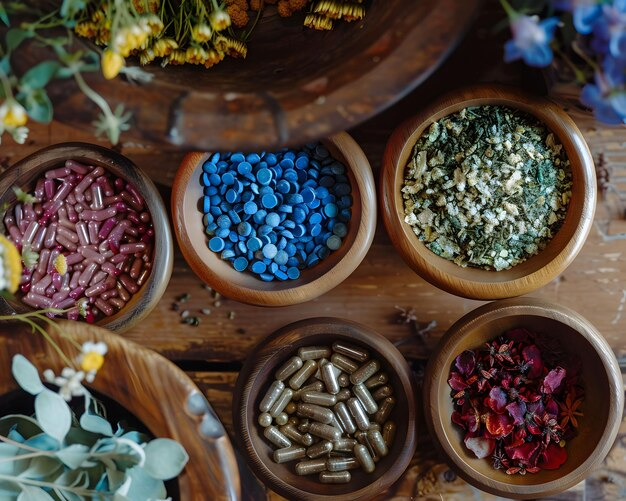
Herbal medicine has a lot of advantages for health; however, one must identify the possible risks and side effects very well. Natural remedies are considered to be safe but they also come with the danger of drug interaction and side effects. In order to find out about suitable use and possible dangers of herbs, it is strictly imperative.
Let’s know some common risks and side effects and also describe what can be done in order to use herbal treatments at home as safely and correctly as possible.
What are the common side effects of herbal medicine?
Common side effects of herbal medicine include digestive issues, allergic reactions, and skin irritation. Some herbs, like ginseng, may cause headaches or insomnia if used excessively. Always monitor your body’s response and discontinue use if you experience adverse effects.
Most assume herbal medicine to be safe, however, adverse reactions can happen as far as the herb employed, its dosage, or the user’s level of sensitivity. For example, St. John’s Wort causes photosensitivity, while prolonged use of licorice root may elevate blood pressure. Nausea, diarrhea and, or ‘bloated’ stomachs following on the heels of some herbs may be common digestive complaints.
Similarly, skin irritation as well as allergic reaction towards the skin often especially occurs through topical application of essential oils. Understanding how your body reacts and talking to a doctor prior to the use of any herbs may help to reduce the possibilities of these events. Also, avoid jumping straight to higher intake amounts. It is always safer to start low and later increase as you note how well it is tolerated.
Can herbal medicine interact with prescription drugs?
Herbal medicine can interact with prescription drugs, potentially altering their effectiveness or causing adverse reactions. For instance, St. John’s Wort can reduce the efficacy of birth control pills. Always consult a healthcare provider before combining herbs with medications.
Some herbs can interact with prescription drugs either positively or negatively and have dangerous results. An example of this would be taking blood thinners together with ginkgo biloba which increases risk of bleeding. Taking St. John’s wort also induces an interaction with many medicines such as antidepressants and contraceptives and diminishes their action.
Other forms such as herbal teas, herbal supplements and essential oils are also structurally modifying altering the pharmacokinetics of drug absorption. Always be sure to avoid dangerous interactions by letting your doctor know any herbs you are taking in addition to prescription medications. Coordination of herbal and allopathic treatments must be timely and responsible to ensure safety of patients.
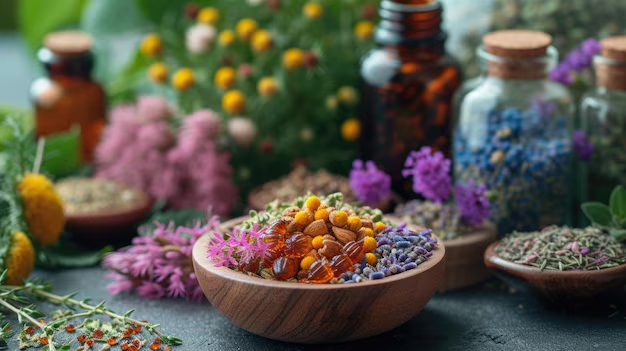
What precautions should be taken when using herbal medicine?
When using herbal medicine, start with low doses, avoid combining herbs with similar effects, and consult a healthcare provider for guidance. Pregnant women and those on medications should take extra precautions to avoid harmful interactions.
To use herbal medicine properly, the risk of getting hurt from it is avoided. Small initial doses should be tried first in order to know the reaction the body would provide, especially on new herbs. Since the aim is not to heap additional sedatives on top of one another, herbs with similar characteristics must only be few in number so as not to take them at the same time.
Pregnant and breastfeeding females should be recommended by the health care provider according to their condition prior to medication; and diagnosed patients with specific medical conditions. There is the proper usage of herbs, and that requires monitoring of body reactions for abnormal responses, knowledge of the right dosage, and research on possible interactions with medication. Proper education and direction will avoid undesirable outcomes.
Are there specific herbs that should be avoided during pregnancy?
There are specific herbs like pennyroyal, mugwort, and black cohosh should be avoided during pregnancy due to their potential to cause uterine contractions or other harmful effects. It’s crucial to consult a healthcare provider before using any herbal remedies during pregnancy.
Pregnant women should avoid using herbal remedies because certain herbs may have risks such as miscarriage or preterm labor. Certain herbs historically used to induce menstruation such as pennyroyal or mugwort should not be ingested. Black cohosh tea, considered a proficient help during menopause might also trigger contractions of the smooth muscles in the uterus enhancing risks during conception.
Even a common herb like peppermint or ginger should be consumed in moderation and only after the first trimester. It is advisable to seek the help of a qualified and practicing doctor with regard to the herbal treatments concerned with supplementation during pregnancy so that neither mother nor infant is put at risk.
What are the risks of using herbal supplements long-term?
The risks of using herbal supplements long-term can lead to dependency, toxicity, or diminished effectiveness. Some herbs, like licorice root, can cause high blood pressure with prolonged use. Regular monitoring and periodic breaks are recommended to reduce potential risks.
Herbal products and supplements can be of certain health benefits but use of such products on regular basis for long can be dangerous like for example, misuse or chronic poisoning. Chronic use of high doses of kava has been shown to be hepatotoxicity. Continuous consumption of licorice root increases blood pressure and lowers potassium.
Furthermore, some of the herbal dietary supplements may not be as effective over time because a tolerance develops in the body. To reduce the risk of such occurrences, it is best to cycle off the use of the herbs’ school session or the use of certain aids with a proper prescription. Regular visits with the doctor will in turn ensure that the long term use of herbs is effective.
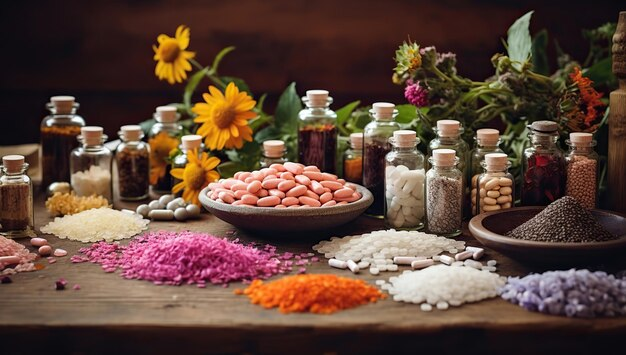
How do allergic reactions to herbs manifest?
Allergic reactions to herbs can manifest as rashes, hives, itching, or swelling. In severe cases, reactions may include difficulty breathing or anaphylaxis. Always perform a patch test with new herbs, especially topical applications, to minimize the risk of reactions.
Various allergic symptoms to herbs have been documented, including rashes, hives, and local pruritus. Essential oils, such as tea tree or lavender oil used on the skin, can also produce such irritation or allergic response. Physical irritation from ingested herbal treatments may also occur, but this is common among those who are allergic to plants. In very rare occurrences, there may be anaphylaxis which makes it difficult to breath and is a medical emergency.
In advance of applying new ratio bliss, employees can avoid allergic reactions to the herbal topical. In the case of eating herbs, it is recommended to limit the portion to the smallest one and monitor the reaction of the organism. Any allergy symptoms would require an immediate stop in treatment and may warrant further medical intervention.
Can children safely use herbal medicine?
Children can safely use herbal medicine, but dosages should be much lower, and certain herbs like eucalyptus or ginseng should be avoided. Consulting a pediatric healthcare provider before introducing herbal remedies is crucial to ensure safety.
While herbal medicine may have a place in treatment for children, dosages must reflect their pediatric level. Still, caution should be exercised when treating youngsters with herbs as they react differently than adults would. While most herbs, for instance, fennel and chamomile are considered to be safe for infants and often used by them as a remedy for bellyaches, others could be too strong for the wee babies, e.g., eucalyptus or ginseng.
Care should be taken and any herbal supplement given to the child on the prescription of a pediatric healthcare provider. Oils are also banned for kids under 2 years, as it can cause respiratory problems. Parents are suggested though to give herbal medicine to children.
In Conclusion
It is still basic to assess and be conscious of the dangers and risks of herbal medicine use. It is undoubtedly that herbs are medicinal plants and patients need them, but patients should be knowledgeable of the danger with herbal plants also. Severe adverse effects that can be of cumulative nature over time may be prevented by being observant of proper dosages recommended, seeking medical advice, and being aware of the response of the body to medication. Thus, they contribute to health and changes to be prevented and maybe altered or change diseases.
Herbal Medicine
Herbal medicine is a treatment method that uses plants’ healing properties by concentrating them into different forms in order to heal various diseases or improve general well being. It is among the oldest known systems of care.
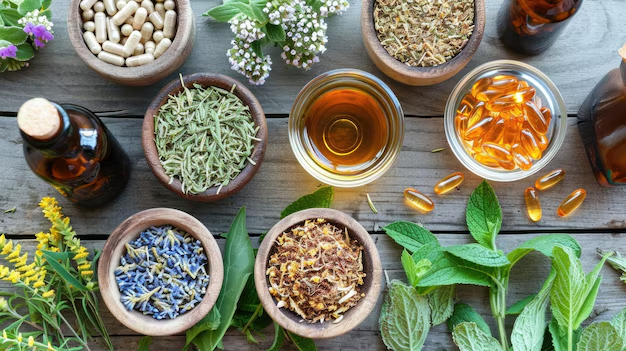
Creating an herbal healing environment in your home empowers one to manage one’s wellness. Having the means to cultivate, prepare, and consume herbs in a contained environment brings out the maximum effects of all that nature has to offer. This manual walks you through the process of setting up an herbal practice space, choosing the right herbs, and learning how to prepare them correctly. Follow these guidelines and create your home as a healing center.
What are the essential tools for practicing herbal medicine at home?
Essential tools for practicing herbal medicine at home include glass jars for storing herbs, a mortar and pestle for grinding, strainers for infusions, and a scale for accurate measurements. Proper tools ensure the effective preparation of herbal remedies.
You will also need measuring spoons, droppers for tinctures, and appropriate labels in addition to jars, strainers, and a mortar and pestle. Fine and safe storage and preparation techniques do help retain the potency of the available herbs so that one can make the best out of them.
Optimal quality containers that are not plastic-made, so contamination might be prevented; implement sanitation of all the implements after every check-up; all the implements should be well-sanitized. It is also practical to use the right tools since you can formulate the right treatments without harming yourself and your family as a result of the practice of herbal medicine at home.
How do you grow medicinal herbs at home?
To grow medicinal herbs at home, choose herbs that do well in your climate, and give them sunlight, water, and adequate soil. Basil, mint, and chamomile are examples of herbs that are very easy to grow and are good for indoor or outdoor planting.
One of the most important steps includes choosing organic seeds and planting them in fertile soil. Most of the herbs also need a minimum of six hours of exposure to the sunlight; hence the pots should be kept either on a window sill or brought out. Regular watering should be done but there is a need to balance as too much can lead to root rot.
Artificial light can be used in some cases especially for indoor growing herbs or growing plants United States outdoors, and natural light is not adequate. Cut down the herbs only when they’re thoroughly grown, but cut down not more than a third of the plant at a time if you want it to continue growing well.
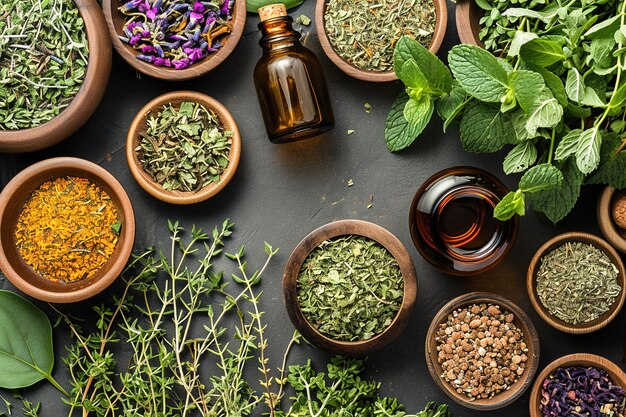
What is the best way to dry herbs for medicinal use?
The best way to dry herbs for medicinal use is to hang them in a well-ventilated, dry area out of direct sunlight. This preserves their potency and prevents mold growth, making them ideal for long-term storage.
To dry herbs effectively, tie small bunches together and hang them upside down in a dark, well-ventilated space. The high temperatures also deteriorate essential oils which contain most of the therapeutic effects of the herbs. You could also try a dehydrator but with the lowest setting.
Herb drying is important in order to keep the effectiveness of the herbs for a long time. After the herbs are dry, they may be stored in glass containers with lids, protected from high temperatures and humidity. Don’t forget to write the name and date on the tag as well.
How do I prepare herbal teas for healing?
To prepare herbal teas for healing, steep dried or fresh herbs in hot water for 5-10 minutes. Common healing herbs for tea include chamomile for relaxation and peppermint for digestion. Strain before drinking to enjoy the full benefits.
There is a ratio of herb to water which should be observed when making herbal teas. On average, One tablespoon of dried herbs or two tablespoons of fresh herbs per cup of boiling water is a safe norm. Cover the vessel and allow the herbs to steep for 5-10 minutes before straining them out.
Longer steep times are acceptable for stronger teas but do not over-extract the herbs when steeping as the tea will taste bitter. Herbal teas are versatile in that they can be taken warm or chilled. Common combinations include chamomile and lavender for sleeping, ginger, and peppermint to aid digestion. It is well advised to strain tea before taking it and honey is used to sweeten it if need be.
How do you make herbal tinctures at home?
Making herbal tinctures at home involves soaking herbs in alcohol or glycerin for several weeks. Alcohol extracts the beneficial compounds effectively, while glycerin is used as a non-alcoholic option. Store in dark bottles for long-term use.
When preparing a tincture, you only require a glass jar, fill half with the dried herbs or if using fresh herbs two-thirds and pour alcohol it to cover the herbs completely usually vodka or brandy. Seal the jar thoroughly and store it in a cool, dark place where it will stay for four to six weeks by shaking the jar daily.
Using a clean jar, pour the liquid after the sediment has been strained through a fine mesh or cheesecloth and dispense small drops from the droppers using small dark glass bottles. They contain vasodilators that are still very concentrated and may be used safely with two drops applied under the tongue, or in a glass of water, but should be gradually advanced according to individual tolerance and needs.
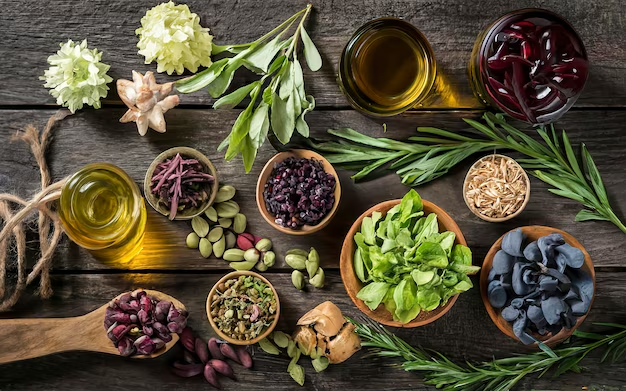
What are the health benefits of herbal baths?
Herbal baths offer relaxation, detoxification, and skin nourishment by infusing warm bath water with medicinal herbs. Popular choices include lavender for relaxation and eucalyptus for respiratory relief, creating a holistic healing experience.
But if you want to take an herbal bath then you can do so by herbal sachet bathing. Take a few dried rose flowers, say up to 5 about 15 g of lavender, and put in some muslin or even a handkerchief and then pour some hot water over the sachet. Alternatively, you may prepare it as a floral tea and add it to your bath water.
The hot water also activates the goodness and nutrients so that when the effect reaches your skin it will not be just for adornment. Bathing in herbal water is effective for relaxing. It helps to mind over the body and food miscellaneous time-consuming, pain-free, and effective for skin nourishment. The use of essential oils or sea salts will intensify everything so it is quite possibly worth it.
How can I store herbs properly to retain their medicinal properties?
Herbs should be stored in airtight glass jars away from direct sunlight and moisture to retain their medicinal properties. Proper storage ensures their potency and longevity, allowing you to use them effectively over time.
When dried herbs have been prepared, they should be put in clean air-tight glass containers for storage to minimize the entrance of air and moist. Keep the distributions in a cool and dark place because heat and sun may spoil them. Put labels on the jars stating the herb’s name and the storage date to prevent loss of flavor.
All herbs will retain the essential oils for one year if they are well stored. Avoid the use of plastic containers, which may leach toxins, and inspect them for any signs of spoilage or mold before using them. Care in how the herbs are stored will be critical in ensuring that their medical value is retained for future use.
In Conclusion
The advantage of doing herbal medicine at home is that it makes easy the dedication of a corner for that purpose and allows healing through natural methods. With the right equipment, methods of growing and preparation of the plants, herbal medicine is now possible for every person in their everyday life. Proper storage helps you use your herbs well since you will be able to have them potent for longer. Try them on one or two at a time, experiment with them, and really enjoy the feeling of being able to take care of your body.
Herbal Medicine
Herbal medicine is a treatment method that uses plants’ healing properties by concentrating them into different forms in order to heal various diseases or improve general well being. It is among the oldest known systems of care.
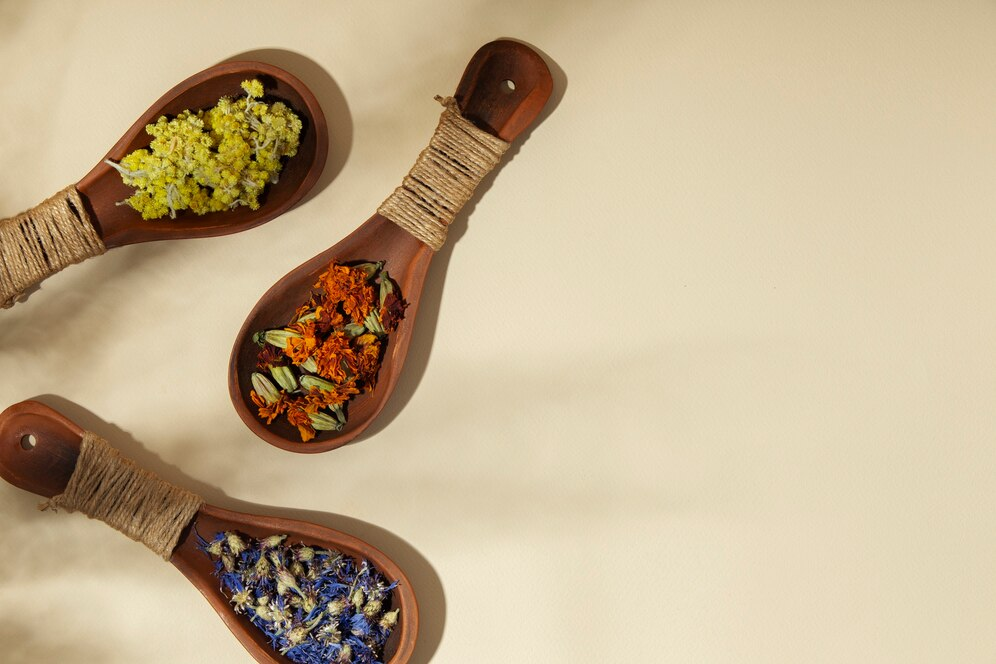
Forming a community around herbalism creates a platform for practitioners and individuals who are passionate about herbalism to learn from, back, and share experiences with each other. Meeting others who are on the same journey as you, encourages you to grow, learn, and work together with them.
Practicing herbal medicine to any degree is always enhanced by being a part of a community, and such a partnership is very helpful irrespective of whether you are a beginner or an experienced herbalist in practice.
How can I find a local herbal medicine community?
To find a local herbal medicine community, search for local herbalist groups, workshops, or classes. Community centers, health food stores, and wellness events often host herbal gatherings. Attending these events allows you to meet practitioners and share experiences, building relationships within your community.
In many cities, herbalist groups or wellness-related groups that support the interest in herbalism and related topics can be found and they often have regular meetings. These meetings are an opportunity to practice what you have learned and a chance to make friends with local herbalists. Local bulletin boards or more informal boards at community centers and health food stores usually post circulars and announcements regarding such events as herbal workshops and other upcoming herbal occasions.
What are some online platforms for connecting with herbalists?
Popular online platforms for connecting with herbalists include Facebook groups, Reddit communities, and specialized forums like HerbMentor. These platforms allow you to ask questions, share knowledge, and engage in discussions with herbal medicine practitioners from around the world.
Facebook groups like ‘Herbalists and Wild Crafters’ and subreddits like “r/Herbalism” are great for meeting herbalists from various countries. HerbMentor is a website that offers people interested in herbs a forum with a clear purpose and activities as well as courses and literature. Interacting in forums is very important as it makes you learn and look at issues from different angles as well as keep up with the trends.
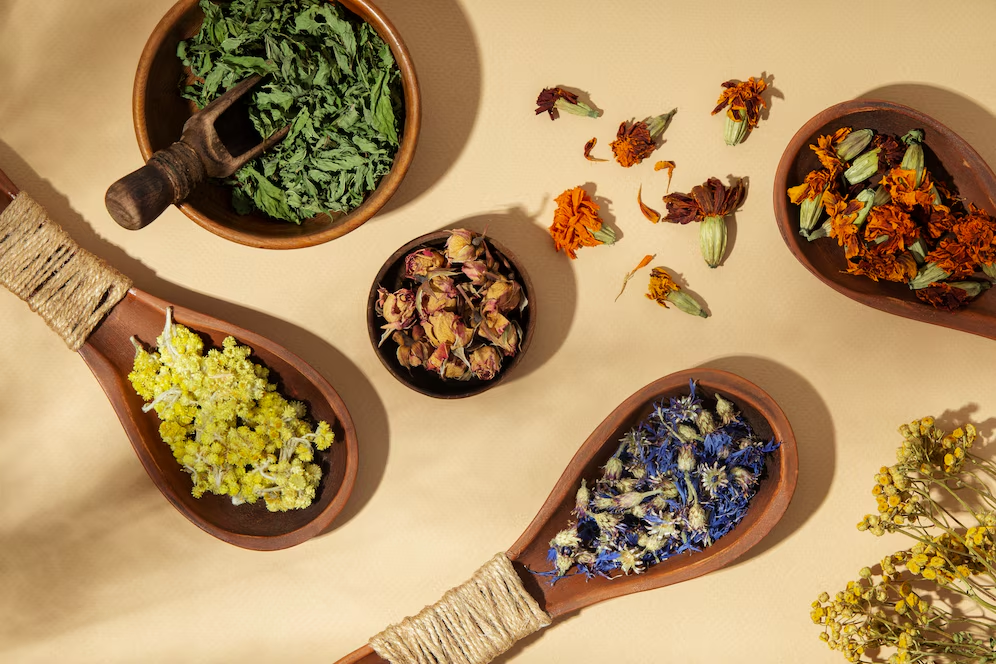
What events help connect herbal medicine practitioners?
Herbal medicine conferences, festivals, and workshops are ideal events for connecting with practitioners. Events like the American Herbalists Guild Symposium or the International Herb Symposium bring together herbalists from across the globe to share knowledge, skills, and networks.
Herbal conferences, such as those organized by the American Herbalists Guild Symposium are very informative as top specialists are present there. There are also such events as workshops, local festivals, and many other teaching activities, which include demonstrations of exhibits, discussion, and practice. These events are very good for creating networking, finding new opportunities in herbal medicine, and improving yourself in practice.
How do you benefit from joining an herbal medicine community?
Joining an herbal medicine community offers the benefits of knowledge-sharing, collaboration, and networking. You gain access to resources, support, and expert advice, allowing you to deepen your practice. Communities also offer mentorship opportunities and collective problem-solving for specific herbal challenges.
This study shows that belonging to the community offers the opportunity to share experiences and appreciate the knowledge gained from the experiences of other people. When such communities come together, challenges may be addressed from the formulation of the remedies to the appropriate sources of quality herbs. They also provide support especially in dealing with the activities of herbal medicine practice which can be complicated.
What are some key herbal medicine organizations to join?
Key herbal medicine organizations include the American Herbalists Guild (AHG), United Plant Savers, and the National Institute of Medical Herbalists. These organizations offer resources, professional development, and community networking for herbalists, providing opportunities to connect with practitioners worldwide.
Free educational materials, certification, and herbalists support networks are made available for members of professionalism organizations like American Herbalists Guild (AHG). United Plant Savers is concerned with the ethical practice of using medicinal plants, and hence engages in their protection. These Liaisons offer an opportunity for herbalists in the womb resume herbal practice.

How do mentorships help build community in herbal medicine?
Mentorships provide a valuable way to build community in herbal medicine, offering personalized guidance and expertise. A mentor can help you refine your skills, offer insights on advanced herbal practices, and introduce you to other practitioners, fostering a sense of belonging and shared growth.
Mentorships are beneficial since they provide the novice herbalists with some hands-on exposure from experts which eases their transition period. While doing so, it is not uncommon for the mentors to teach ways of formulating sophisticated remedies and even bring the proteges into contact with their colleagues. It allows for enhanced feeling within the herbal fraternity.
How can social media help create an herbal medicine community?
Social media platforms like Instagram, YouTube, and TikTok are effective tools for creating and participating in an herbal medicine community. By following herbalists, sharing content, and engaging in discussions, you can connect with others, learn new practices, and stay updated on herbal trends and techniques.
Particularly on Instagram, herbalists can post images of herbs, remedies and tutorials. Further deepening this understanding Videos can be used as Youtube containing interviews and workshops. In addition, herbal tips can be offered in the user-friendly manner of video clippings via Tik Tok. All such means give you the opportunity to meet experienced and novice herbal practitioners thus broadening your knowledge and connections.
Conclusion
Developing a community that fosters the use of herbal medicine is a vital practice for self and career evolution. Not only does one go out looking for local communities to join, but one can also use the internet or seek people to mentor her/him in order to grow. Learning from each other in a healthy herbal community has no price and all eyes are geared to growth.
Herbal Medicine
Herbal medicine is a treatment method that uses plants’ healing properties by concentrating them into different forms in order to heal various diseases or improve general well being. It is among the oldest known systems of care.
Herbal Medicine
Herbal medicine is a treatment method that uses plants’ healing properties by concentrating them into different forms in order to heal various diseases or improve general well being. It is among the oldest known systems of care.
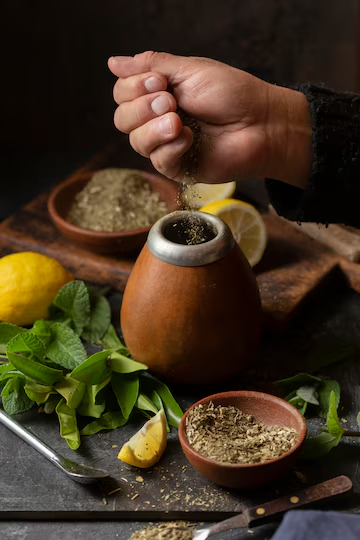
Herbal medicine, which has been widely used for communication for many years, seems to invite even modern critiques more than other practices. With an increasing number of individuals seeking natural health solutions, it is crucial to consider the negative perceptions of herbal treatment. In this article, we are going to address some of the most frequently asked questions and issues, helping to understand some of the difficulties and dilemmas that advocates and practitioners have to face.
What are common criticisms of herbal medicine?
Many critics argue that herbal medicine lacks rigorous scientific testing, making efficacy claims unreliable. This concern is compounded by the fact that the regulation of herbal products is often less stringent than pharmaceuticals. As a result, there are significant questions regarding quality control and consumer safety.
Critics remark on the lack of comprehensive documents that contain evidence of the level of safety of herbal-regimes. With no effort to create universal benchmarks, many herbal solutions go unproven in terms of effectiveness. At the same time, patients who use herbal therapies may experience serious side effects and risks due to misuse and interactions of herbal and conventional drugs leading to understaffing and understudying of experts and the field.
How does herbal medicine compare to conventional medicine?
Herbal medicine emphasizes holistic treatment, focusing on prevention and overall wellness, whereas conventional medicine typically targets specific symptoms or diseases. This fundamental difference in approach can lead to a debate about efficacy and philosophy in healthcare.
Supporters are herbal medicine advocates and explain how it is possible to affect with lesser harm to the body which is not necessarily the case since it is often treated using several therapeutic agents for several herbs given in combination to exert synergistic effects on the body. However, there are also harsh critics of this alternative medicine who claim that this popularity is not justified by any substantial evidence base. It is quite clear where the main part of this difference lies and it is quite clear why this has to be understood, and also the opposite point of view as well.
What are the safety concerns regarding herbal supplements?
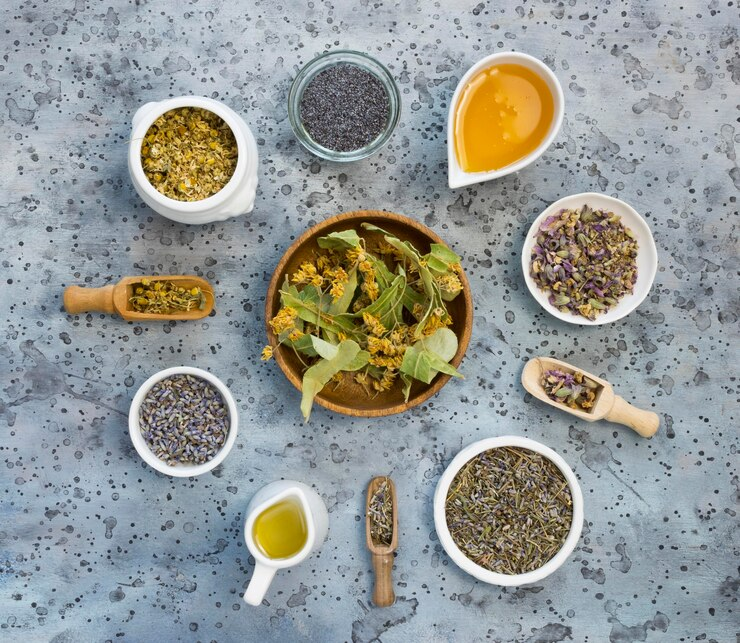
Safety concerns about herbal supplements include issues such as contamination, mislabeling, and inconsistent dosages. Some herbal products may also cause adverse effects or interact negatively with prescription medications, leading to significant health risks for consumers.
This is because consumers are likely to be unaware of these risks which is why there is a need for more education and regulation in the herbal market. They should also be assisted in making sure that they have up to date and accurate information in the market so as to protect their health and wellbeing. And in this regard, the herbal industry can in fact push for unjustified protectionism and work for safer environment and customer advocacy.
Why do some people distrust herbal medicine?
Distrust in herbal medicine stems from a combination of anecdotal evidence and the absence of comprehensive clinical trials. Many individuals may have encountered ineffective treatments or negative experiences, leading to skepticism about the effectiveness of herbal remedies.
Even the media can fuel public opinion, but in reverse. This is not to say that herbal medicine is all bad, but, like all medicine, it does have pros and cons. Practitioners have to be able to properly communicate and share their knowledge and experiences as this culture of distrust can be an obstacle to openness towards the herbal alternatives.
What role does evidence play in the acceptance of herbal medicine?
Evidence from scientific studies plays a critical role in bolstering the credibility of herbal medicine. Well-conducted clinical trials can demonstrate efficacy and safety, helping to attract broader acceptance among healthcare professionals.
On the other hand, the absence of supporting documents can breed doubts and concerns. With the continuous growth of the herbal sector, there is the need to continue conducting research to support or counter any claims made by manufacturers to help the customers. There must be coherence in order that such interventions by patients do benefit the patients.
How can herbal practitioners address the controversies surrounding their practice?
Herbal practitioners can effectively address controversies by advocating for transparency and education. By providing patients with reliable information about herbs, potential side effects, and interactions, practitioners can foster trust and credibility.
Combining herbal medicine with modern medicine can also legitimize the practice. Practitioners will be able to reassure patients regarding the safety and effectiveness of herbal medicine by integrating various disciplines.
What future trends might impact the perception of herbal medicine?
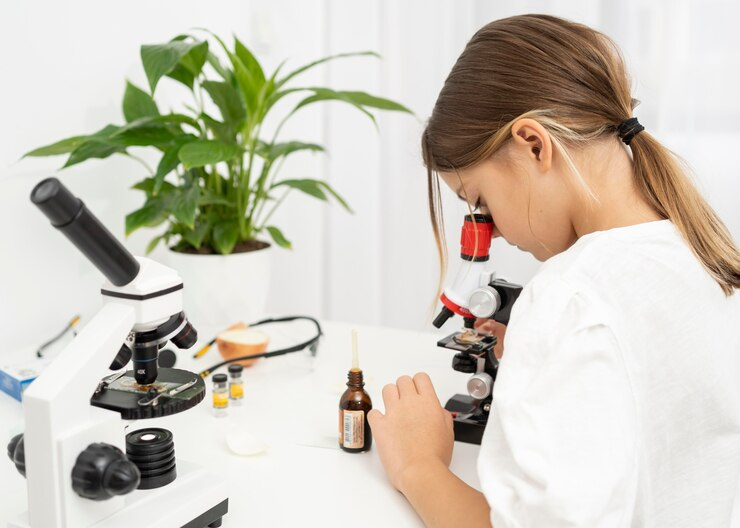
Future trends may significantly impact the perception of herbal medicine, particularly the increasing demand for personalized healthcare solutions. As research methodologies advance, there is potential for stronger evidence supporting herbal efficacy.
A heightened sense of awareness of all-round health care could also alter public opinion positively such that more people will want to make use of herbal options. Furthermore, changes in the regulations may improve the risk profile of herbal agents giving rise to enhanced receptiveness and changes in their usage patterns.
Conclusion
The issues surrounding the use of herbal medicine have many dimensions. In Countering the above arguments & answering the concerns of herbal skeptics, the advocates and practitioners would try to arrive at a better representation of the facts relating to herbal medicine. With change in research trends environment and growing consumers interest, it becomes necessary to strengthen the safety, education and transparency in the field of herbal medicine. There is always a need for traditional practices and scientific approach to work hand-in-hand primarily for the benefit of people looking for natural remedies.
Herbal Medicine
Herbal medicine is a treatment method that uses plants’ healing properties by concentrating them into different forms in order to heal various diseases or improve general well being. It is among the oldest known systems of care.
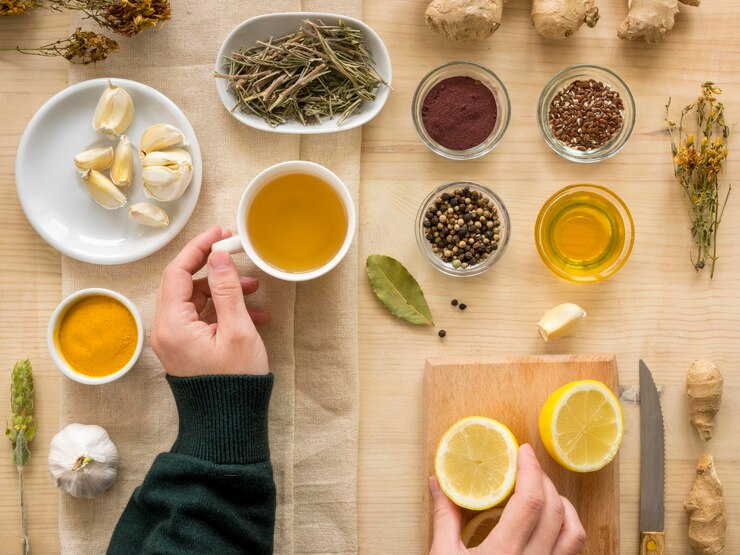
Herbal medicine as early as ancient times, has been important in a person’s physical, psychological, and spiritual well-being. The use of herbal medicine in this course of self-discovery, as it were, can be the most phenomenal experience a person may ever have. In particular, those who are driven for self-change can benefit from the use of herbs that enhance not only their emotional control but their willpower also. In this writing, we will look at the prospects of self-healing with these plants by looking at both more basic and more abstract approaches.
How does herbal medicine support emotional balance in personal growth?
Herbal medicine support emotional balance in personal growth by regulating hormones and promoting mental clarity. This emotional stability fosters deeper self-awareness, which is essential for personal growth.
The origins of emotional balance are in personal development. There are quite a number of herbs that have the capacity to influence emotions by acting on the endocrine and nervous systems. For instance, Ashwagandha is an anti-stress herbal plant that works by lowering the activity of the hormone cortisol which is triggered when the body is subjected to stress. If ashwagandha is taken for a period of time, one is able to properly deal with worries and stress resulting in a better emotional state.
Another useful herb that is frequently spoken of as one of the spa herbs is chamomile. Additionally, it also helps to render soothing effects and as such assists in dealing with daily stress better. Lavender, widely known for its lovely scent, has an influence on the nervous system in such a way that it helps the body to feel calm. The reason is that when one is emotionally regulated, it becomes easier to be self-reflective, self-aware, or even self-driven and challenge oneself without being overwhelmed by one’s feelings.
Can herbal medicine improve mental clarity for personal development?

Yes, herbs like ginkgo biloba enhance mental clarity by improving blood flow to the brain, supporting focus and productivity essential for personal development.
Having a clear mind is important for personal growth and development. It must not be possible, whether learning new subjects, going for a new career, or contemplating self-reflection, without having clear mental faculties. Ginkgo biloba, as one of the most prevalent herbs for brain health, stimulates blood circulation to the extend that oxygen and nutrients are more available in the brain. Due to better blood flow, people will remember more, pay attention for longer, and process information faster. If these benefits are practiced over time, it becomes easier for an individual to think rationally and to make proper judgments how one is basing his arguments on.
Apart from the ginkgo biloba, bacopa monnieri is another herb effective in enhancing the cognitive capability of a person. Known primarily in the traditional Ayurvedic medicine, bacopa facilitates improved memory and learning, hence new material can be easily learned and understood. Therefore, by including ashwagandha and other herbs into your daily practices, you are able to sharpen your mind significantly, which is essential in one’s personal growth.
How does herbal medicine promote physical health for personal growth?
Herbal medicine promotes physical health for personal growth by enhancing immunity, reducing inflammation, and boosting energy, providing a foundation for sustained personal growth.
Grounded health is the foundation of the ability to evolve as a person. When there is no healthy body in a person, the prospects of emotional or mental or spiritual growth seem impossible. Herbal medicine gives a range of ways to maintain a good state of a body by upping the immunity, lowering swelling, or increasing energy levels. Echinacea is a great herb that positively affects one’s immunity. This herbal supports white blood cells production and thus helps in combating diseases.
Turmeric with its active ingredient curcumin provides anti-inflammation and analgesic activity. Turmeric has the ability to lessen any degree of swelling and pain through its anti-inflammatory properties. Since there is less chronic inflammation, there are also fewer limitations to enjoying physical health. This in turn translates to people being able to engage more in other non–work activities and pursue of other personal goals without any degree of physical discomfort. In addition, adaptogenic plants such as ginseng will enhance your physical capacity securely without any of the caffeine side effects, supporting long-term development.
What role do adaptogens play in stress management for personal growth?
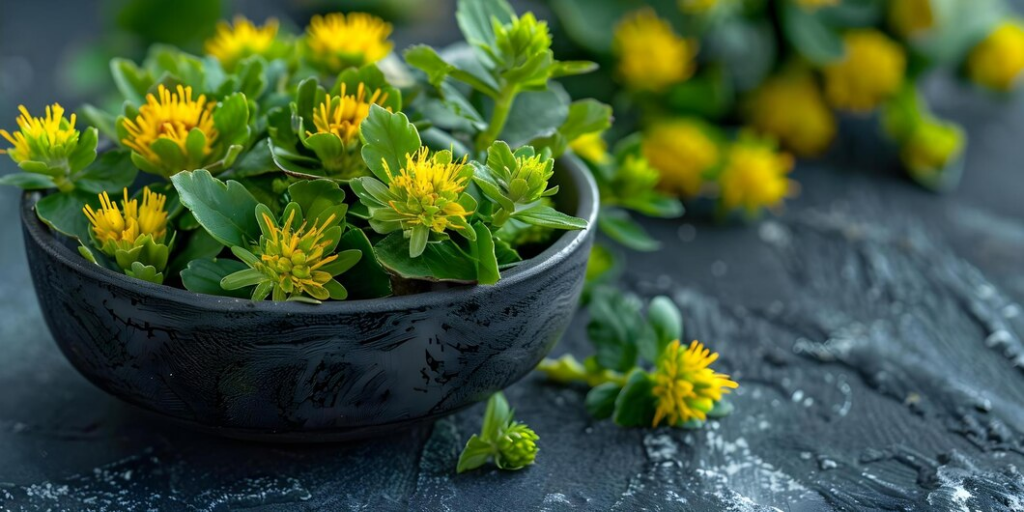
Adaptogens like Rhodiola and holy basil help the body adapt to stress, reducing fatigue and promoting resilience, which are key to personal growth.
Personal stress is among the chief impediments to self-development. It becomes very hard to even think of attaining any goals in the long run, maintain emotions, or do one’s usual day-to-day activities with any motivation when the stress is at its peak. Adaptogens are a specific group of herbs that tackle this issue naturally. These herbs work toward normalizing the body’s stress response system by averting excessive cortisol levels which keeps the body working normally even under duress.
Rhodiola rosea, for example, helps combat fatigue and puts one in a better mood by assisting in the regulation of serotonin and dopamine in the brain. It is also of importance in improving physical stamina, which comes in handy for people trying to manage work, children and self-improvement. Holy basil, the other adaptogen comes in to stabilize the sugar levels reducing the stress-triggered highs and lows. No, they don’t simply smooth away stress, but rather they enhance one’s ability to cope with stressors over time. These adaptogens will still be able to channel your energy to better yourself even when all hell breaks loose.
Can herbal medicine enhance spiritual growth?
Herbal medicine enhances spiritual growth by promoting mindfulness and meditation through calming herbs like sage and lavender.
Usually, there are efforts to incorporate more than just self-discipline in the tasteful development, like internal vision and the world beyond the body. This deeper understanding has been promoted through the use of certain herbs which have been used since antiquity. One of those herbs is sage. It has been used in cleaning procedures throughout different cultures, where it is used to smoke the interior or the person to get rid of unwanted energies. One of the most commonly practiced use of sage is as incense to cleanse the area. The essential oils and fragrance derived from sage give a certain level of mental focus and concentration on spiritual matters thereby enhancing easier meditation or prayer.
Lavender is another herb which has gained a lot of fame for promoting a person’s concentration and better performance. It is one such herb which is rather commonplace that works towards soothing the nervous system and inducing relaxation thereby helps one achieve a meditative way of being. Such a calm level of being allows a person to look within and opens ways to undertake a spiritual quest. With a consistent use of the herbs, it becomes easy to create an ambiance conducive to spiritual nurture, mental resilience, and peace which are necessary aspects for any form of spiritual development.
How does herbal medicine support long-term lifestyle changes?
Herbs like green tea and ginger support metabolism and detoxification, making it easier to sustain long-term lifestyle changes and personal growth.
Incorporating various lifestyle changes can go a long way in achieving positive personal changes over time. It can be changing infiltration diet, increasing the intensity of workouts, or practicing meditation; Ayurvedic medicine can act as a physiological change agent to ensure that the change is sustained.
A good example is green tea, which is an antioxidant drink and also known to boost metabolism which helps in weight control and energy levels. For an energy boost, the caffeine in Sovereign Tea works gently without the energetic crash associated with a sugar rush.
Ginger, on the other hand, assists in the digestive process and removes toxins from the body that may have accumulated due to unhealthy eating patterns or exposure to environmental toxins. They support physical health and mental functionalities, which makes it easier to achieve both short- and long-term ambitions. These habits, which are also accompanied by herbal medicine, lead to better health and quality of life.
Can herbal medicine improve sleep quality for personal growth?
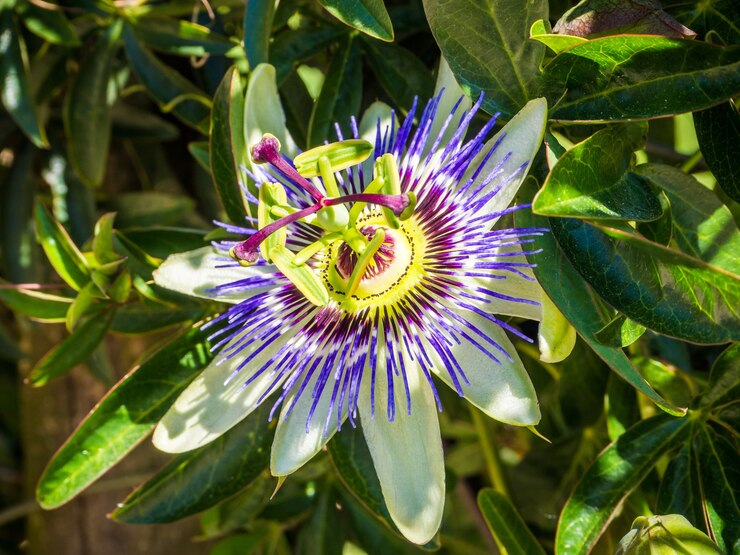
Herbal remedies like valerian root and passionflower improve sleep quality by calming the nervous system, which is essential for personal growth.
Sleep has been known to be this important and therefore, cannot be overlooked. An individual who does not get the requisite amount of rest suffers the loss of effectiveness, responds poorly to stress, and suffers various health complications. Another common herbal medicine for those who can’t sleep is valerian root. It helps one to sleep by promoting the GABA neurotransmitter which has the effect of calming down the nerves.
Another very widespread herbal remedy, passionflower, is effective in the treatment of tension and over-activity in the brain that could interfere with the process of falling asleep. Buy these herbs to help prevent extended periods of shallow or superficial sleep, which interferes with proper brain activity, emotional stability, and the ability to repair the body. Getting enough sleep leads to waking up in a more energetic state every day so that self-improvement goals can be pursued and achieved vigorously.
Conclusion
Herbal medicine is helpful when coming to improving the body and emotions as well as advocating for personal growth in the mental and spiritual aspects of an individual. It is possible to achieve emotional balance, optimization of mental faculties, stress management and overall well-being by taking advantage of hormone herbs. Be it facilitates sleeping, enhances immunology, or strengthens the spiritual path of living, herbs always provide the right answers. All you need is to take the first step, form a habit and watch the way in which herbal medicine will make your journey of self-improvement easier and faster.
Herbal Medicine
Herbal medicine is a treatment method that uses plants’ healing properties by concentrating them into different forms in order to heal various diseases or improve general well being. It is among the oldest known systems of care.
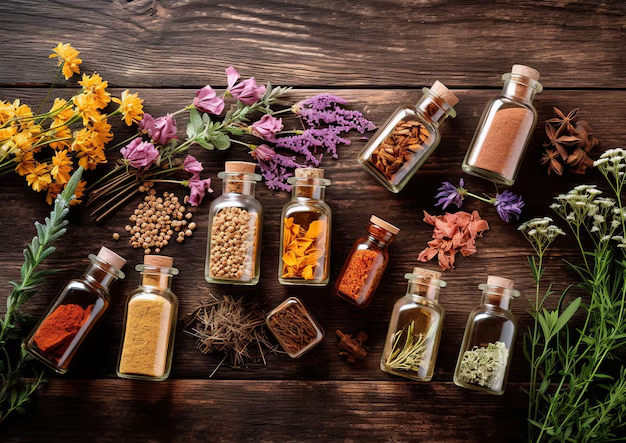
Herbal medicine’s alternative branch is herbal medicinal practice which focuses on improving people’s health with herbs. However, to be able to fully ‘reap’ the benefits of herbal treatment, proper guidance is a prerequisite. Rubs, liniments, and ointments have their order of application, the amount that is to, as well as the application of several herbs, all these span and rule over all the herbs for some better effects. Let’s comprehend the advanced therapeutic concepts accordingly.
How can you ensure the proper dosage when using herbal medicine?
Proper dosage of herbal medicine is crucial for effectiveness and safety. Always follow guidelines provided by certified herbalists and product instructions. The dosage depends on factors like age, weight, and the condition being treated. Consulting a professional ensures personalized and accurate dosing.
Typically, a herbalist or a health professional takes such measurements while prescribing herbal medicine, it is done based on age weight and health status of the person which will end up suiting your needs. In most cases and in supplementation, the label has a dose for the medication that ought to be respected except on doctor’s advice altering the prescription.
There are some herbs that can be excessive causing side effects, other herbs can be low in quantity therefore no effect can be observed. Following repeated bookings with the herbal medicine specialist, one often adjusts the quantity in that they understand the condition, how effective treatment has been and what the illness is. Dosing regimens are based on the assumption that all the maximal necessary components of soldering are employable and no further wastage can be borrowed.
What are the best ways to combine different herbs for healing?
Combining herbs for healing can enhance their overall effectiveness. Some herbs work synergistically, complementing each other’s benefits. For example, pairing anti-inflammatory herbs with immune-boosting ones provides comprehensive support. Always consult a qualified herbalist to ensure the right combinations for your health needs.
For instance: turmeric in conjunction with black pepper is known to be better retained by the body, while the combination of echinacea over the elderberry is more beneficial against illnesses than The Berry alone. The blending of several herbs in one formula is a practical approach as ailments and multiple symptoms are treated rather than just one aspect.
On the other hand, certain properties of herbs could be detrimental. Some may cancel the effect of the other which will be very illogical. It is reasonable to consult an expert and come up with a formulation that is tailored for specific health needs so that the desired effects will be achieved in all instances.
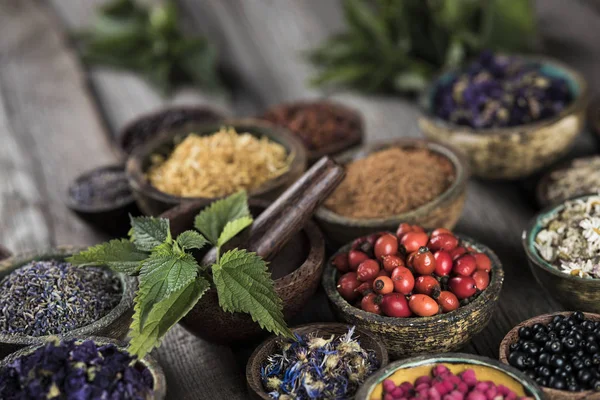
What is the ideal time to take herbal medicine for maximum effectiveness?
The ideal time to take herbal medicine depends on the herb and the condition being treated. Some herbs are best taken on an empty stomach, while others are more effective with meals. Timing can influence absorption and effectiveness, so follow your herbalist’s recommendations for optimal results.
There is a certain time for which various herbal medicines are most effective. For instance, ashwagandha which is an adaptogenic herb may be best used in the morning when one needs energy, whereas, calming herbs like chamomile or valerian root are most effective before sleeping.
There are also digestive herbs like ginger that are used effectively when taken before meals for the purpose of inviting digestion, while others like turmeric can be used with food to promote assimilation. In such cases, it is best to consult your herbalist/ or product instructions about the timing of every herb. Proper timing can actually increase the healing action of the herb and the amount that will be absorbed increases tremendously.
How can diet and lifestyle affect the effectiveness of herbal medicine?
Diet and lifestyle can significantly impact the effectiveness of herbal medicine. Eating nutrient-dense foods supports the body’s absorption of herbs. A healthy lifestyle, including regular exercise and stress management, enhances the body’s ability to respond to herbal treatments and boosts overall healing.
For example, turmeric taken with fat enhances the healing capabilities because their absorption is only facilitated by fats. It is the same case with these practices which incorporate adequate physical activities, proper sleep, and relaxation techniques such as yoga or simply meditation, which assist in the body’s self-healing processes. It is practically clear that normal modes of diet and activity complement herbal treatment in order to take full advantage of nutritional medicines.
What are the potential side effects of herbal medicine and how to manage them?
Some herbs may cause mild side effects like digestive upset or allergic reactions. To manage these, start with low doses and monitor your body’s response. Consult an herbalist if side effects occur, and stop taking the herb if symptoms persist. Proper guidance helps minimize risks.
Herbal medicine is relatively safe, but there are those who experience undesirable effects, especially when the limits for dosage or other medications used in conjunction with the herbs are exceeded. Nausea and headache are among the most often reported side effects, or even more extreme side effects such as skin rashes.
To cope with it the initial lower dosage ought to be observed and later increase dosage but only under recommendation of the practitioner. If you think that the negative effects don’t feel comfortable over time, you should discontinue treatment and speak to either an herbalist or a specialist. Documentation and reporting any side effects from herbs to your practitioner cannot be overemphasized because it will help in customizing an appropriate herbal regimen for you.

How can you store herbal medicine to preserve its potency?
Herbal medicine should be stored in a cool, dark, and dry place to preserve potency. Exposure to light, heat, and moisture can degrade the active compounds. Proper storage ensures the herbs maintain their effectiveness for a longer period, maximizing their healing benefits.
To store them effective and avoid spoilage, herbs must be packed in tightly fitting containers but should hermetically not be exposed to the sun. The tinctures must be stored in cold places such as refrigerators as they have high-quality components that have to be preserved. The shelf life is also important, because the medicinal properties of herbs have a tendency to diminish with the passage of time.
Herbs may be stored appropriately for periods of from six months to two years depending on the herb. It is only when you maintain these storage conditions that you will ensure that your herbal preparations remain effective and offer all the therapeutic benefits intended when in use.
How long does it take to see results from herbal medicine?
Results from herbal medicine vary depending on the condition and individual. Some herbs provide relief within a few hours, while others may take weeks of consistent use. Patience and consistency are key to seeing the full benefits of herbal remedies, especially for chronic conditions.
There are some organic cold cures and herbs perform very well, therefore, such patients may expect relief within days such as echinacea. However, there are some ailments which are not able to clear in a few days but rather in the reach of weeks provided the herbal remedy is consistently taken.
Once you evaluate the need for medication compliance she is likely to also be patient regarding herbs recommendations for dosage and usage. Regular follow-ups will also help in assessing the status of the patient and if need be, any changes to the treatment outlined can be done.
To Wrap It Up
The practice of herbal medicine entails that, among other factors, things like axing of herbs, their spouses and physical activity of the individuals is taken into consideration. Appropriate engagement of the relevant herbalist embodies the focus of contemporary drug development to the specific treatment procedures. In Orienting the Organization towards an effective health care system, there is always patience that has to be put in consideration especially when using safe and relatively cheap approaches aiming at high-quality health benefits. There is a maximum effectiveness in medicines on natural bases which can be achieved by following expert opinions about medication.
Herbal Medicine
Herbal medicine is a treatment method that uses plants’ healing properties by concentrating them into different forms in order to heal various diseases or improve general well being. It is among the oldest known systems of care.
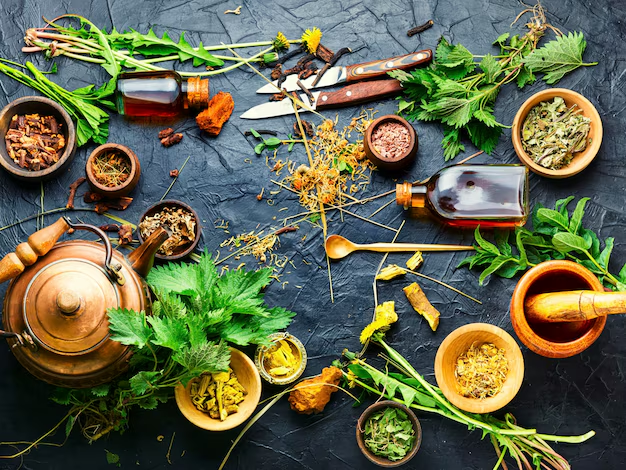
The combination of herbal medicine with conventional medicine and complementary methods improves health and well-being. This combination is beneficial in that it enables the treatment of the body in a comprehensive manner and at various levels. It is important to know how herbal treatments function in conjunction with other medications or approaches in order to avoid interaction.
How can herbal medicine complement conventional treatments?
Herbal medicine complements conventional treatments by providing natural remedies that enhance overall wellness without replacing pharmaceuticals. Herbalists work with healthcare providers to avoid interactions and improve treatment outcomes. Herbs can help manage the side effects of drugs or address conditions that pharmaceuticals don’t target effectively.
Herbs are also common in treatment of side effects of orthodox drugs for example cancer treatment drugs that cause nausea. In addition, they also help in the extrusion of metabolic waste that occurs as a result of overflowing the body with prescribed medications. Herbalists see to it that they are in communication with physicians regarding herbal medicine as a means of treatment in conjunction to the orthodox medicine administered to the patients.
With this method, patients can take the benefit of the two separate approaches and improve their health status by taking natural medicines while the prescribed medications are still taken. The married approach contributes to an increasingly coordinated health enhancement because problems are solved from various aspects in order to achieve the desired results.
What precautions should be taken when combining herbal medicine with pharmaceutical drugs?
Precautions when combining herbal medicine with pharmaceutical drugs include consulting with both your herbalist and doctor. Certain herbs may interact with medications, leading to reduced efficacy or side effects. Monitoring dosage and understanding potential interactions are critical to ensure safety and effectiveness.
When combining herbs and drugs, the important aspect to bear in mind is that some of these herbs may potentiate the action of drugs while others may reduce their action. For instance, someone taking medications for depression should not use St. John’s Wort while somebody taking anticoagulants should avoid garlic, as it would increase the chances of bleeding.
As a point of precaution, it is good practice to disclose all herbal supplements to your healthcare providers to avoid unexpected complications. Your healthcare providers should work together and assistance is rendered in prescribing medication and supervising its use. Relatively safe and effective treatment approaches require periodic evaluation of the medication and herbal medicines.
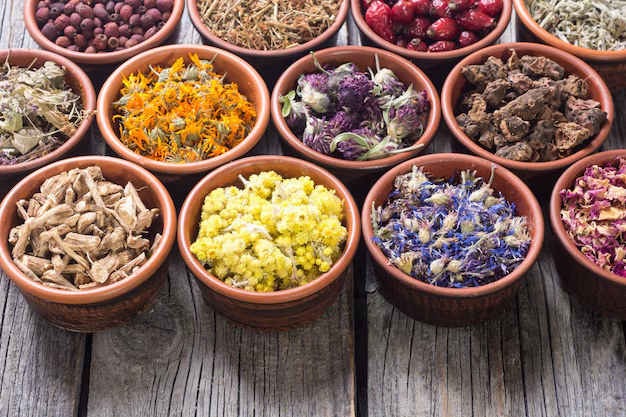
How do herbal medicine and acupuncture work together?
Herbal medicine and acupuncture work together by targeting the body’s energy systems and internal health simultaneously. Herbs strengthen the body internally, while acupuncture improves energy flow and reduces pain. Together, they create a holistic healing approach that addresses both physical and energetic imbalances.
Acupuncture is performed by invoking special points on the body for the releasing of obstructions experienced on the energy (Qi) and herbal medicine on the other hand acts as a supporting and nourishing component of the internal organs and systems in the body. Typically, the two courses of treatment are Interlinked, as in combination, acupuncture reduces the pain and speeds up the healing process when taken with herbs.
Herbal therapies, on the other side, may help the effects of acupuncture last more in terms of harmony and health until the next session. The combined effect is often found in the perspective of chronic illness, especially in relation to stress management systems and managing digestion disorders issuing relief from the causes and the symptoms of the diseases.
What are the benefits of combining herbal medicine with homeopathy?
Combining herbal medicine with homeopathy provides a dual approach to natural healing. Herbal remedies address physical symptoms and organ support, while homeopathy focuses on energetic balance. Together, they provide comprehensive treatment for both the body and mind, enhancing overall wellness and healing capacity.
The conjunction is effective as it can provide both physical and energetic healing at the same time. For example self-heating herbs can bend the curves of immunology, and homeopathy can play on the energies and the emotions self-regulation.
This type of treatment is welcome for the management of chronic conditions, stress, and even emotional imbalances as it addresses the condition from different angles so as to give a wholesome treatment.
How can herbal medicine be integrated into physical therapy?
Herbal medicine can be integrated into physical therapy by using anti-inflammatory and pain-relieving herbs to support recovery. Herbs like turmeric and arnica can reduce inflammation and speed healing. They complement physical therapy exercises by addressing internal healing, enhancing the overall recovery process.
These herbs contribute to pain relief, enhance blood flow, and repair the injured tissues which complement the exercise and manual therapy during the physical therapy sessions. Physical therapy aims to strengthen the muscles and improve the mobility of the patient, while the herbs would deal with any underlying inflammation and pain causing the number of healing times to increase. This constitutes a comprehensive recovery process with rapid enhancement in the active range of motion and improved pain control.
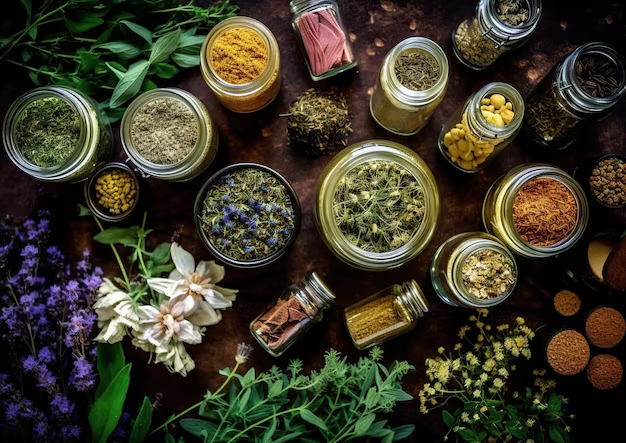
What role does nutrition play in combining herbal and conventional therapies?
Nutrition plays a crucial role in combining herbal and conventional therapies by supporting overall health and treatment outcomes. A balanced diet enhances the effectiveness of both pharmaceuticals and herbal remedies. Proper nutrition helps the body process medications and herbs more efficiently, promoting optimal healing.
For instance, certain anti-inflammatory herbs mentioned above work inefficiently if the diet included is devoid of the appropriate nutrients. Complementary nutrition prevents the body from getting weak and therefore any partner in health that tends to combine the two approaches is effective. Herbal medicine, on the other hand, is likely to enhance the results of chiropractic care.
How can herbal medicine enhance the effects of chiropractic care?
Herbal medicine enhances chiropractic care by promoting internal healing and reducing inflammation. Anti-inflammatory herbs like turmeric or ginger can alleviate joint pain while stress-relieving herbs support nervous system function. Together, they create a balanced approach to musculoskeletal health and pain relief.
Valerian root or ashwagandha, both stress-relieving herbs, might help to dissipate excessive nervous tension and add to the positive effects of chiropractic therapy. Taking all these together: faster psychosomatic rehabilitation, mobility improvement, and alleviation of chronic pain for the long term, help in solving the problems of the physical health of the body.
In Conclusion
The incorporation of herbal medicine manifests an open approach to health and healing. Integrating these multiple systems guarantees not only that the physical body is taken care of but the energetic aspect of the body is also enhanced, thus improving treatment outcomes. Superior results are achieved when herbal medicine and acupuncture, chiropractic care, and even pharmacotherapy are used in conjunction. The current guide discusses all these treatment modes with a view toward optimal health and therefore joyous decision-making.
Herbal Medicine
Herbal medicine is a treatment method that uses plants’ healing properties by concentrating them into different forms in order to heal various diseases or improve general well being. It is among the oldest known systems of care.
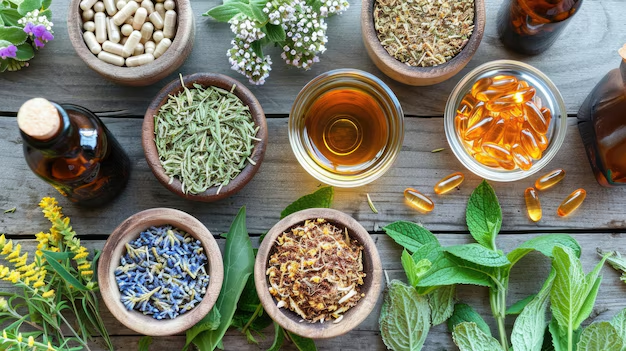
A good outcome can only be expected if the best herbal medicine practitioner is selected. As several practitioners are present, such questions as accreditation, experience, and approach should be researched. Having an idea of assessing clearly how credentials and communication skills work can make the process easier.
What credentials should a qualified herbal medicine professional have?
A qualified herbal medicine professional should have certifications from recognized herbalism schools and associations. They should be knowledgeable about plant-based remedies and hold a license if required by the state.
Knowledge and experience regarding both folk and current herbal practice is essential. In addition, a review or testimonials offer an advantage. Experience would be just as important to determine their competency in regard to the treatment of the ailments specified.
Some practice areas do require licenses or continuing training programs for herbal practitioners, so checking such requirements adds a degree of assurance. To ask about how they blend traditional principles of herbal treatments and methods of modern medicine. It also helps to determine that the techniques being utilized by the practitioner are safe and adequate.
How can you verify a herbalist’s experience and expertise?
Verifying a herbalist’s experience involves checking their years in practice, client testimonials, and any case studies they provide. It’s important to ask about their specialization in treating specific conditions. Additionally, professional memberships in herbalist associations can signify expertise.
Further, case studies may be of importance since they offer real instances of the effectiveness of the client. Testimonials may provide a clearer image of the client’s efficiency in treating certain conditions. This is typically the case where they belong to professionally regulated bodies such as the American Herbalists Guild and the like.
Inquiring about their specialty area is also helpful in determining whether the herbalist has appropriate skills that suit your health requirements whether it is general wellness or target ailments like backache or anxiety.
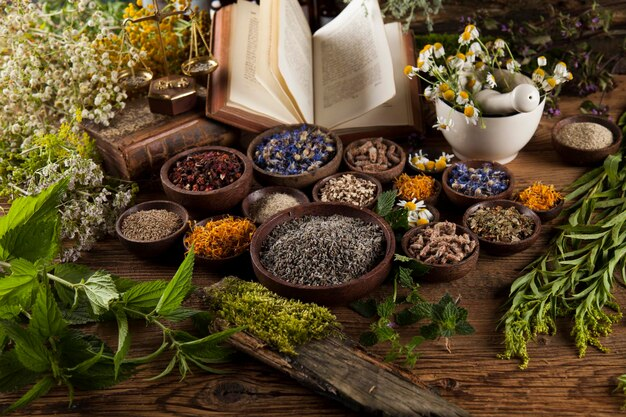
What questions should you ask during an initial consultation with a herbalist?
During the consultation, ask about their approach to treatment, any potential side effects, and how they monitor progress. Inquire about the integration of herbs with any medications you’re currently taking. Finally, ask about the duration of treatments and their expected outcomes.
Primary sessions such as these would span for at least an hour and should explain the treatment philosophy as well as the tailoring of the herbal solutions. This would be an appropriate time to inquire if there is any assessment to be done prior to the treatment advice, which medications are combined with, how long the treatment is going to take, and whether results will be witnessed over time.
Being able to state how they intend to do this broadens the scope of the nurses. Including a clear strategy for future appointments, how the patients will be assessed, and evaluation of patient outcomes. These consultations provide verification that the therapy is appropriate according to one’s health objectives and that a sufficient perspective is used by the herbal practitioner.
What should you avoid when choosing a herbal medicine professional?
When choosing a herbal medicine professional, you should avoid choosing herbalists who lack proper certifications or those who make exaggerated claims about cures. Be cautious of practitioners who don’t ask about your medical history or current medications. A lack of transparency about ingredients and preparation methods is also a red flag.
An unqualified herbalist might also avoid asking you pertinent questions regarding your medical background, which is considered a serious lacuna. They should always check your history and current medicines so you don’t interact badly. Practitioners who promise a cure or appear full of miracle-like results are also not operating on ethical grounds.
A good herbalist provides treatments to improve conditions, not actually to make miracles happen. Avoid those who won’t say what they prepared theirs with and where they sourced their herbs. This is a sign that something is wrong with either the quality or the safety. For safety and effectiveness, choose an integrative, science-based practitioner.
How does a qualified herbalist integrate herbs with conventional treatments?
A qualified herbalist integrates herbs by understanding how they interact with conventional medications. They conduct thorough consultations to assess your current prescriptions and offer herbal remedies that complement them. Their goal is to enhance overall treatment without causing adverse reactions or diminishing the effects of pharmaceutical drugs.
A licensed herbalist will always request the medications and the supplements that you currently use so that they can prevent them from interfering adversely with the treatments. The herbs have the potential of either enhancing or negating the effectiveness of the orthodox treatment procedures after the herbal treatment, hence the integration must be cautious.
The practitioner should avoid advising herbs that will beneficial is herbal medicine alone without supporting your treatment. With regular practie, they may refer you when needed to your core healthcare professional so that treatment is comprehensible. It is also necessary to conduct most of the treatment sessions on the patients’ follow-ups so that changes and cupboard cultivation of treatments is done securely and efficiently.
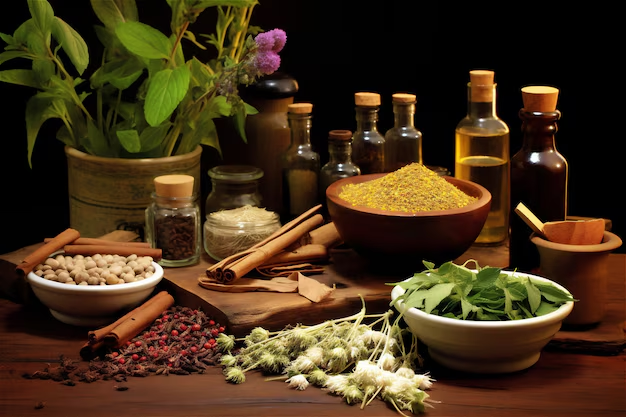
Why is professional membership important for herbalists?
Professional memberships show that the herbalist adheres to high standards of practice. Organizations like the American Herbalists Guild offer ongoing education and ensure ethical conduct. These memberships reflect the practitioner’s dedication to staying updated on the latest research. It’s a reliable indicator of trust and professionalism.
The ethical codes and the standards of scientific integrity are more often advocated to herbalists who are affiliated with recognized professional societies. These memberships entail compliance with ethical standards, continuing education, and applying best practices in the field of herbal medicine. Membership also means access to contemporaneous developed knowledge, which guarantees that they will provide clinically relevant treatments.
In addition, most of these organizations have a complaints system with disciplinary procedures which adds some accountability. In the case of looking for an herbalist, membership bearing guarantees that this particular herbalist met basic accepted professional standards and will be able to provide safer and more effective treatment.
How often should you see a herbal medicine professional?
Frequency of visits to a herbalist depends on your health condition and treatment plan. Initial consultations may require more frequent visits to monitor progress. Once stabilized, visits may reduce to monthly or as-needed check-ups. Regular assessments ensure the effectiveness and safety of ongoing herbal treatments.
This allows the herbalist to observe any adverse effects that may develop from the herbs and gives an opportunity to change the dosage if needed. In such situations, this may be on a weekly or bi-weekly basis as appropriate depending on the seriousness of the condition being addressed. When the condition is under control, appointments tend to be monthly or further apart.
During the initial immune assessment, herbalists will do routine follow-ups or recommend them to continue with the session until the next rainy season or summer. This also gives the patient and the practitioner more time to determine whether the proposed line of therapy is effective and safe as it was envisioned or what changes are needed to improve the safety and effectiveness of the therapy.
In Conclusion
Appointing the right herbal medicine clinician is very important because you will have an opportunity to receive safe and efficient practices that are individualized. Some specific evaluation of practitioners is important with regard to some credentials, experience and practical style prior to entering into any contract. Links of professional organizations, consultations, cooperative in health treatments practices are essential aspects in the quest of how to employ herbal medicine for self and within the primary health care system.
Herbal Medicine
Herbal medicine is a treatment method that uses plants’ healing properties by concentrating them into different forms in order to heal various diseases or improve general well being. It is among the oldest known systems of care.
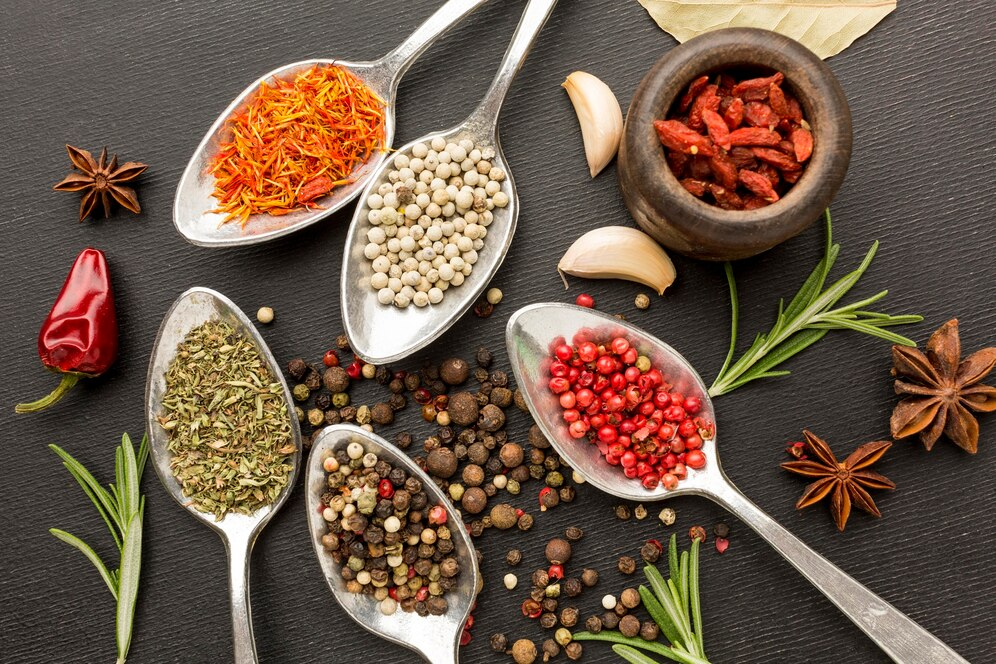
There are many customs and fallacies surrounding herbal medicine that leave many adolescents in confusion regarding its efficacy and safety. These misleading myths create the need to correct them since a clearer situation will emerge concerning how ideal herbs can be. These myths peddle half-baked truths about herbal medicine and in doing so, it hide true benefits and advantages of herbal medicine
Is herbal medicine always safe because it's natural?
While herbal medicine uses natural ingredients, not all herbs are safe for everyone. Some herbs can cause side effects or interact with medications. It’s crucial to consult with a healthcare provider before using herbs, ensuring they’re appropriate for your health needs and won’t cause harm.
Just because an herb is natural does not mean it is altogether safe. For example, certain herbs, when taken with certain prescription medications, may increase or decrease the effects of the prescriptions. Other herbs such as comfrey can cause health complications when misused. One should always seek professional assistance to know if the herbal cure plans will suit and be safe for them.
Do herbal remedies work slower than conventional medicine?
A common myth is that herbal remedies work slowly, but this depends on the condition and the herb used. Some herbs, like ginger for nausea, act quickly, while others, such as adaptogens, take time to balance the body. The speed of herbal remedies varies based on the individual and treatment.
There are cases where herbal medications will act very quickly such as peppermint oil for treating digestive issues, ginger against motion sickness and so on. Other herbs work in the opposite manner where the result comes gradually over a period of time and therefore these herbs such as ashwagandha, target chronic conditions such as stresses and hormonal imbalances. The timeline for results should be expected depends on the herb, herb dose range and the conditions that are being treat.
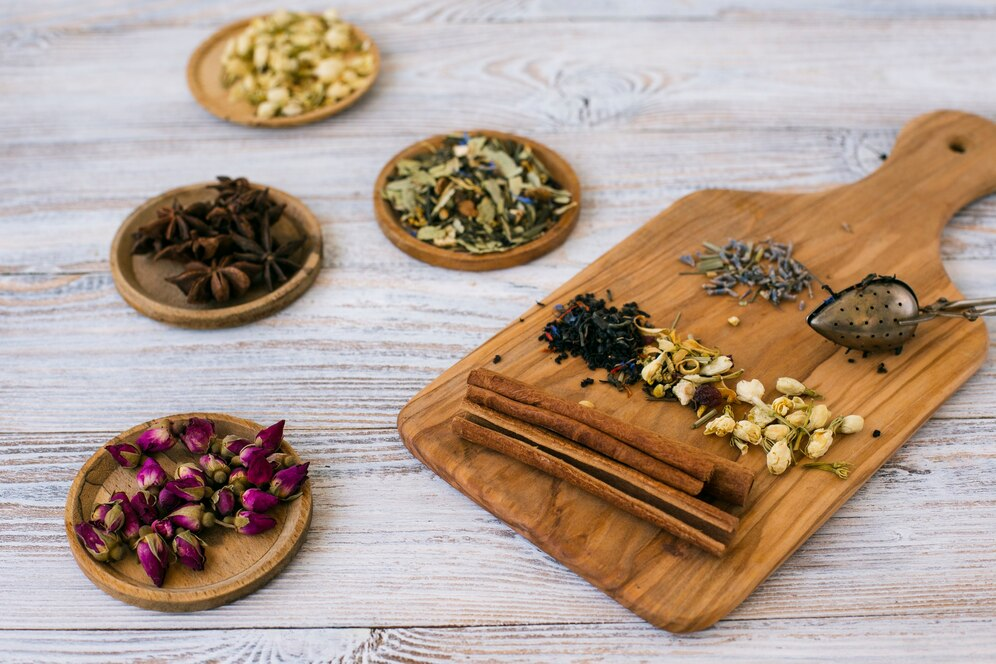
Are all herbal supplements regulated for quality and safety?
Not all herbal supplements are regulated consistently for quality and safety. In many countries, regulations are less stringent for herbal products than for pharmaceuticals. Consumers should research reputable brands that test for purity, potency, and contaminants to ensure they’re using high-quality herbal supplements.
There is no single standard for the herbal supplement industry, therefore product quality is not consistent over the entire industry. Some products might include excipients or impurities, and the active ingredient might not coincide with the label. For her part, it is important to procure the supplements from reputable companies that perform third-party testing.
Can herbal medicine completely replace conventional treatments?
Herbal medicine should not be viewed as a complete replacement for conventional treatments, especially for serious conditions. While herbs can complement medical care, some health issues require conventional treatments like surgery or prescription drugs. Combining herbal medicine with conventional care can offer a more holistic approach to healing.
For such mild conditions such as stress and, digestion issues, it is great to use herbs but the primary therapy should still be the mainstay. Some severe problems such as neoplastic disease or heart disease or infectious diseases might still need the conventional means of treatment. Combining both methods may improve treatment efficacy and health as a whole.
Is herbal medicine only for treating minor conditions?
Herbal medicine is not limited to minor conditions. While it’s effective for everyday ailments like colds and headaches, research shows that herbs can also support the treatment of chronic conditions, including arthritis, diabetes, and anxiety. However, professional guidance is essential for managing more serious conditions.
Many herbs have been proven to offer support and are used in relation to chronic conditions. For example, turmeric for arthritis, or cinnamon in the case of diabetes for regulating blood sugar levels. The herbs may not cure the condition but may enhance the quality of life and relieve the symptoms. A health professional should always be consulted when devising a more effective and comprehensive course of treatment.
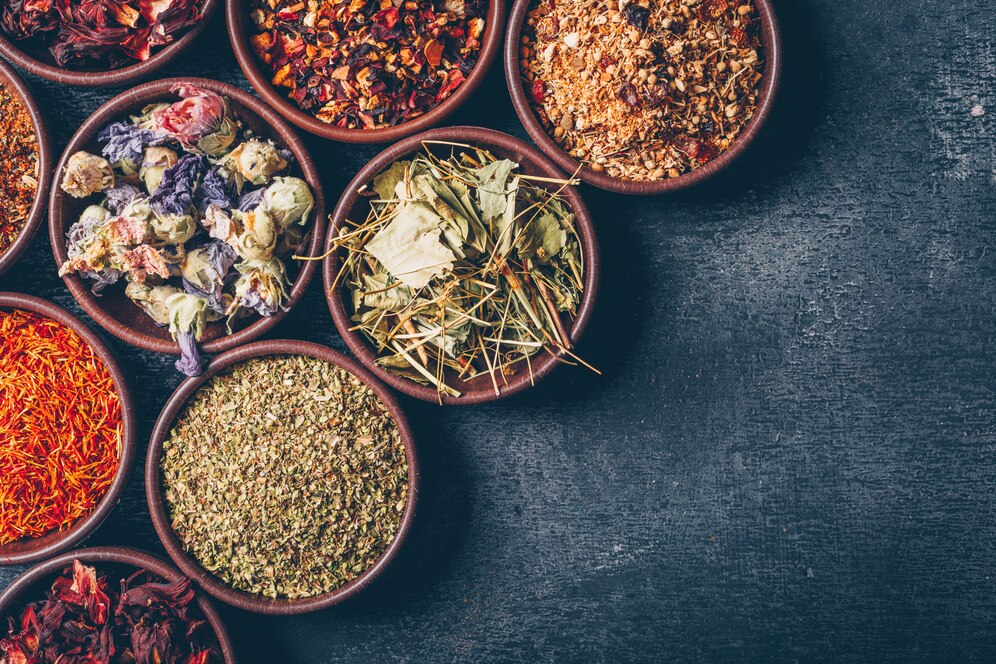
Do you need a prescription to use herbal medicine?
Most herbal medicines don’t require a prescription, but professional guidance is recommended. Many herbal remedies are available over the counter, but using them without understanding dosages, side effects, or interactions with medications can be risky. Consulting an herbalist or healthcare provider ensures safe and effective use.
Herbal medicines are found freely in any health promotes and shops or on the internet especially in the prevalent ones with no prescription. Thus, self-medication can be dangerous whereby attempting to dose oneself medicinal herbs without the proper instruction can lead to ineffective treatment or undesired effects. Advice from an expert enables one to choose the correct medicinal herbs in accordance with one’s state of health and thereby reducing side effects and increasing the perks of the treatment.
Is herbal medicine backed by scientific research?
Contrary to the myth that herbal medicine lacks scientific support, many herbs have been extensively studied for their efficacy. Research has validated the benefits of herbs like turmeric, echinacea, and ginger, showing that they can offer real health benefits when used correctly.
A large number of studies have been done which can confirm the fact that if turmeric has been effective in curbing inflammation or echinacea has increased immune activity anti infection. Other areas require further research, but herbal medicine is getting increasing recognition from the scientific community and supportive evidence is consequently emerging.
Conclusion
The practice of herbal medicine has often suffered from the ill effect of superstitions about its sanity and utility but it is being proved today, due to educational approaches. Correct use of herbs is beneficial but care must be taken in their application. People can easily use herbs for treatment without fear of repercussions by distinguishing the truth about the herbs from the fake information surrounding the herbal treatments.
